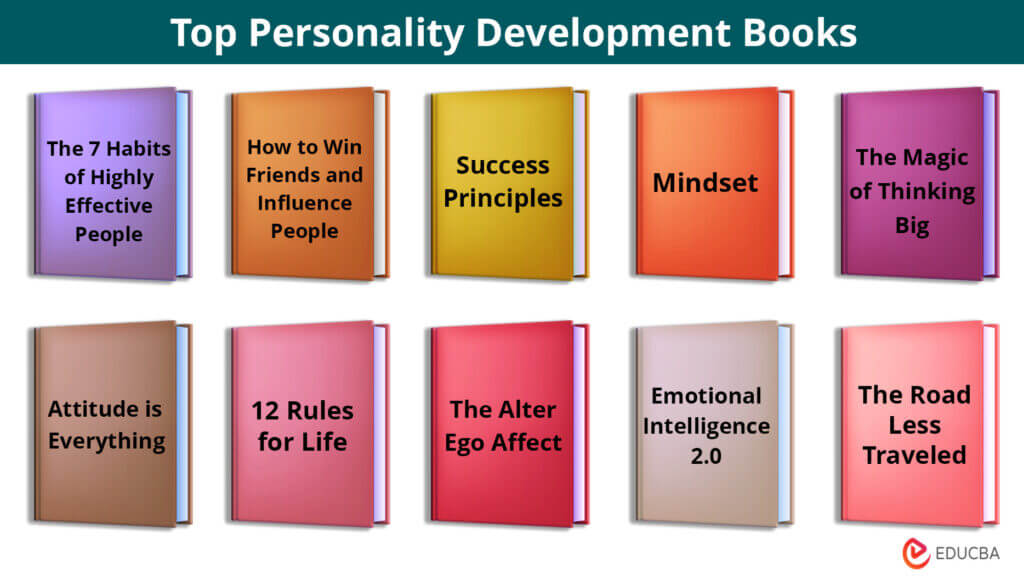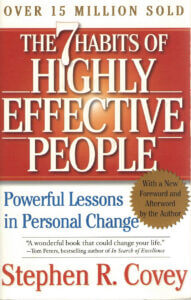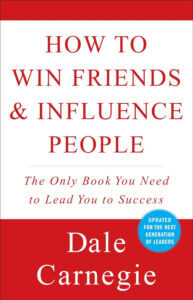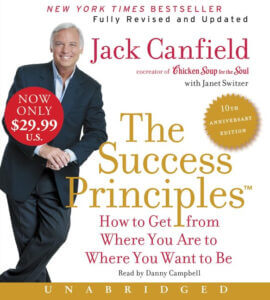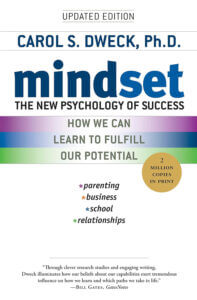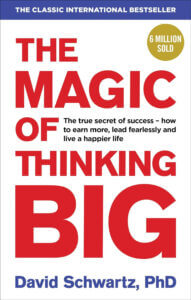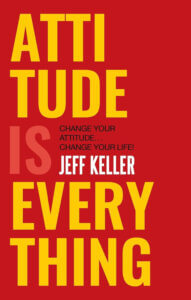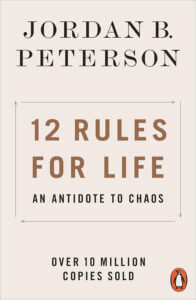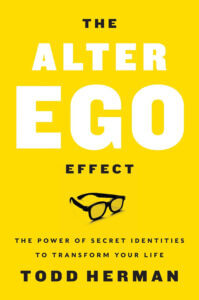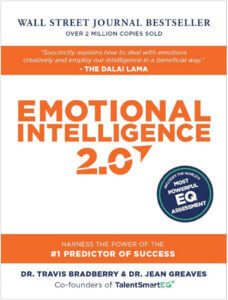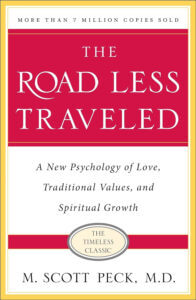Updated December 28, 2023
Personality Development Books – Introduction
Do you love working on yourself? Building a personality that pleases others and helps you live a peaceful and successful life? If yes, these personality development books will help you improve your communication, build interpersonal skills, develop a positive mindset, and more.
The practical guidance, advice, and exercises that you find in these ten personality development books will build your confidence and help you achieve personal and professional goals.
| # | Personality Development Books | Author | Originally Published | Ratings |
| 1 | The 7 Habits of Highly Effective People | Stephen Covey | 1989 | Amazon: 4.6 Goodreads: 4.15 |
| 2 | How to Win Friends and Influence People | Dale Carnegie | 1936 | Amazon: 4.7 Goodreads: 4.22 |
| 3 | The Success Principles | Jack Canfield | 2004 | Amazon: 4.6 Goodreads: 4.25 |
| 4 | Mindset: The New Psychology of Success | Carol Dweck | 2006 | Amazon: 4.6 Goodreads: 4.09 |
| 5 | The Magic of Thinking Big | David Schwartz | 1959 | Amazon: 4.6 Goodreads: 4.25 |
| 6 | Attitude is Everything | Jeff Keller | 2007 | Amazon: 4.5 Goodreads: 4.22 |
| 7 | 12 Rules for Life | Jordan B Peterson | 2018 | Amazon: 4.5 Goodreads: 3.93 |
| 8 | The Alter Ego Affect | Todd Herman | 2019 | Amazon: 4.6 Goodreads: 3.99 |
| 9 | Emotional Intelligence 2.0 | Travis Bradberry and Jean Greaves | 2009 | Amazon: 4.5 Goodreads: 3.84 |
| 10 | The Road Less Traveled | M. Scott Peck | 1978 | Amazon: 4.5 Goodreads: 4.07 |
Check the following comprehensive reviews of each of the personality development books to find the one you need.
Book #1: The 7 Habits of Highly Effective People
Author: Stephen Covey
Review:
This classic book has sold millions of copies worldwide. It offers practical advice on continuously improving yourself through learning, growth, and renewal. The author also writes about personal effectiveness and leadership by mentioning that one must focus on and take responsibility for their own actions. It also teaches you how to stay physically, emotionally, mentally, and spiritually healthy.
Key Points:
- It helps you define your goals and work backward to create a plan to achieve them.
- As per the author, you must prioritize your time and energy based on what is most important to you and focus on the activities that will help you achieve your goals.
- The book also states that you should seek mutual benefit in all interactions and look for solutions that are beneficial to all parties involved.
Book #2: How to Win Friends and Influence People
Author: Dale Carnegie
Review:
This book offers timeless advice on building relationships and influence using effective communication. As per the author, people enjoy talking about themselves, so allowing them to share their experiences and opinions will help you. The book teaches us to use persuasion and influence techniques to help others understand your point of view. Moreover, showing appreciation and respect for others and making them feel valued is the trick to making friends.
Key Points:
- It teaches that a smile is a simple but powerful tool to build rapport with others.
- The author says you need to simply pay attention to what others say, focus on their interests, and tailor your communication to match it.
- As per the book, you must start with positive feedback before sharing criticism or negative feedback.
- It also teaches us to show a sincere interest in others, ask questions, listen actively, use people’s names when we meet them, etc.
Book #3: The Success Principles
Author: Jack Canfield
Review:
“The Success Principles” by Jack Canfield discusses how you should follow simple principles to achieve true success. The author shares personal experiences of applying these principles. This book is a comprehensive guide that goes beyond financial success, influencing positivity, appreciation for small victories, and a renewed focus on what truly matters.
Key Points:
- The book urges readers to take responsibility for their lives, emphasizing that events are not coincidences but are influenced by our actions.
- It teaches the power of visualization, demonstrating how imagining success can improve performance through the Reticular Activating System.
- Encouraging a shift from repetitive patterns, the book advises trying different approaches for personal growth and success.
- The author highlights the importance of maintaining a positive attitude, aligning with the belief that positivity attracts positive outcomes according to the law of attraction.
Book #4: Mindset: The New Psychology of Success
Author: Carol Dweck
Review:
This book explores the concept of a growth mindset and how it can lead to greater success and happiness in life. The author believes that our beliefs determine our behavior and shape our abilities to face life’s challenges. She then explains how anyone can develop a growth mindset through hard work, dedication, and perseverance.
Key Points:
- The book explains how mindsets can affect how individuals interact with others and how they respond to feedback and criticism.
- According to the author, rather than talent, effort and hard work can encourage a growth mindset and foster a love of learning.
- Moreover, embracing failure as a learning opportunity can help individuals develop resilience and perseverance.
Book #5: The Magic of Thinking Big
Author: David Schwartz
Review:
David Schwartz wrote the book “The Magic of Thinking Big” in 1959. So, it does lack some modern references. However, it still delivers a timeless message. Focused on fostering a mindset of unwavering self-belief, the book provides practical strategies to enhance creativity and overcome negativity. It also emphasizes the impact of personal connections and the importance of surrounding oneself with high-quality individuals. The book concludes that self-belief and confidence are pivotal in differentiating success from mediocrity.
Key Points:
- The book says we should strongly believe in our ability to achieve big goals, which boosts creativity for success.
- Schwartz emphasizes the need always to improve creative thinking skills, stay open to new ideas, keep learning, and evaluate oneself regularly.
- The book teaches us strategies, including making a personal pep talk to combat negativity, focusing on unique qualities, and staying positive even when facing negativity.
- It highlights how attitude affects behavior, suggesting aligning behavior with a positive mindset, emphasizing moral integrity, and projecting confidence through intentional actions.
Book #6: Attitude is Everything
Author: Jeff Keller
Review:
Jeff Keller’s “Attitude is Everything” is a transformative non-fiction masterpiece. It underscores the profound impact of positive thinking and the crucial role attitude plays in shaping our lives. The author, a motivational speaker and leader in human motivation, imparts invaluable lessons on visualizing goals, overcoming adversity, and cultivating patience and perseverance. The book’s 12 chapters offer a comprehensive guide on leveraging attitude to achieve long-term success, making it a must-read for those seeking positive change in their lives. Keller’s own journey, transitioning from law to motivational speaking, adds authenticity to his teachings, making this book a timeless and essential resource.
Key Points:
- The book emphasizes the transformative power of positive thinking, asserting that changing one’s attitude can lead to extraordinary results and a renewed approach to life.
- Readers learn to harness the visualization power to attain life goals, with a focus on commitment and dedication to overcome obstacles.
- Keller acknowledges the presence of both positive and negative thoughts but highlights the importance of overpowering negative thoughts to achieve personal growth.
- The book teaches the valuable skill of turning challenges into opportunities, encouraging readers to face adversity with courage and step out of their comfort zones.
- The book motivates readers to take the first step toward success, emphasizing and acknowledging the possibility of failure.
Book #7: 12 Rules for Life
Author: Jordan Peterson
Review:
This book is a unique journey into self-help, combining practical advice, personal stories, academic insights, and intellectual history. Peterson, known for his confrontational style and controversial opinions, shares rules centered on personal responsibility and small choices. However, the book’s elaborate and sometimes harsh language, mixing scolding with metaphysical ideas, can feel like being yelled at by a rugby coach in unconventional attire.
Key Points:
- His academic work focuses on political and religious beliefs through the “big five” personality traits and delves into the psychology of political correctness.
- “12 Rules for Life” advocates personal responsibility, promoting choices that lead to an efficient and orderly life, progressing from individual decisions to broader societal concerns.
- The book revolves around the opposition of order and chaos, with Peterson asserting that order represents truth, while chaos is seen as the “eternal feminine,” drawing on religious and Jungian concepts.
Book #8: The Alter Ego Affect
Author: Todd Herman
Review:
This book is a practical guide on using alter egos to achieve personal and professional goals, drawing inspiration from successful figures like Beyoncé. The book offers three key lessons: identifying your alter ego by analyzing dissatisfiers, detaching from destructive emotions by assigning them an alter ego, and matching the qualities of your alter ego with your goals to improve your performance.
Key Points:
- The book shows us how to analyze dissatisfiers in life to identify areas for improvement and use the five categories of change (stopping, starting, continuing, less of, and more of) to shape your alter ego.
- It states that to repress negative emotions, we must attribute them to a separate character, treating them as an enemy, and diminishing their influence through visualization and self-talk.
- The author says that once you define your purpose and goals clearly, you must determine the attributes your alter ego needs to achieve them.
Book #9: Emotional Intelligence 2.0
Author: Travis Bradberry and Jean Greaves
Review:
This book offers practical advice to improve emotional intelligence for personal and professional success. It provides various self-assessment tools and strategies that help readers evaluate their emotional intelligence skills. It focuses on four main areas: self-awareness, self-management, social awareness, and relationship management.
Key Points:
- The book emphasizes self-awareness in developing emotional intelligence. Techniques like journaling and meditation are suggested for increasing understanding of one’s own emotions.
- It also emphasizes social awareness in developing emotional intelligence and suggests active listening and observing nonverbal cues to understand others’ emotions.
- The author provides strategies for managing emotions, such as taking a pause before reacting, reframing negative thoughts, and practicing relaxation techniques.
- They also provide strategies for building strong relationships, such as developing empathy, communicating effectively, and resolving conflicts in a constructive manner.
Book #10: The Road Less Traveled
Author: M. Scott Peck
Review:
The book encourages readers to take responsibility for their own personal growth and development. The author places the argument that true love involves accepting and caring for others, even when it’s challenging. Peck also stresses the crucial role of discipline in personal growth and spiritual development, as it enables individuals to overcome obstacles and attain their goals.
Key Points:
- This book teaches us to learn from our mistakes and develop a sense of purpose to achieve maturity.
- The book emphasizes that mental health requires coping with challenges positively and taking ownership of one’s life.
- It also states the importance of spirituality in personal growth and development and defines it as a connection with something greater than oneself and a sense of purpose in life.
Recommended Books
If you found this article on top personality development books, visit the following links to read similar articles,
